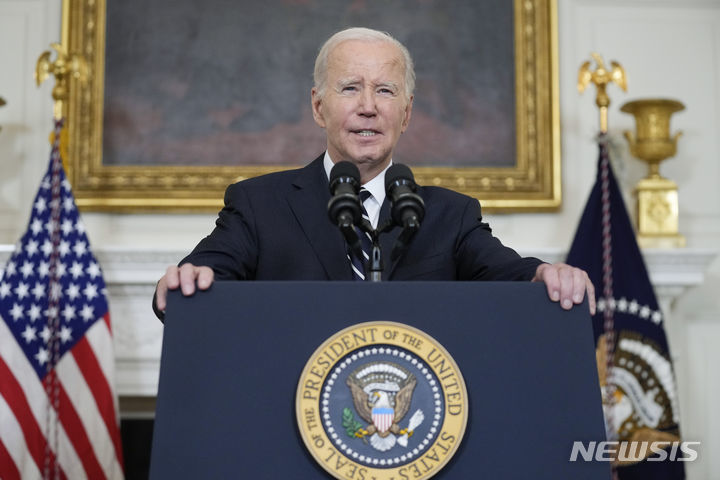The United States and Israel, which has been criticized for an ‘intelligence disaster’ due to its failure to detect a surprise attack on Israel in advance by the Palestinian armed group Hamas, have begun to expand information sharing. This is based on the judgment that this failure was caused by a conflict between the two countries, such as Israel’s opposition to the nuclear negotiations between the United States and Iran, and a reduction in information sharing.
Regarding American hostages detained by Hamas, U.S. President Joe Biden said in a statement on the 9th (local time), “I have instructed my team to share information across the U.S. government and cooperate with the Israeli side in all aspects, including the deployment of experts.” “He said.
 U.S. President Joe Biden is giving an urgent speech about attacks on Israel by the Palestinian armed political faction Hamas at the White House State Dinner on the 7th (local time). 2023.10.08 Washington = AP/Newsis
U.S. President Joe Biden is giving an urgent speech about attacks on Israel by the Palestinian armed political faction Hamas at the White House State Dinner on the 7th (local time). 2023.10.08 Washington = AP/NewsisNBC reported, “The United States is discussing ways to expand sharing of satellite images and wiretapping information to support Israel.” This means that the U.S. intelligence agency will provide IMINT (image intelligence) and SIGINT (signal intelligence) collected through reconnaissance satellites to Israel. This measure is interpreted as a response to growing criticism that the U.S. Central Intelligence Agency (CIA), as well as Israel’s Mossad, which is considered the world’s best intelligence agency, failed to understand Hamas’ full-scale attack movements in advance.
In the United States, there is an analysis that points to the deterioration of the relationship between the two countries as the reason for the failure of this information war.
The two countries’ intelligence agencies have signed an agreement and have regularly shared wiretapping and wiretapping information. With the collapse of HUMINT (human intelligence network) at major Middle East bases, including Iran and Lebanon, the United States actually relied on Israel for confidential information, such as the movements of terrorist groups, collected by field informants, but instead provided extensive wiretapping and wiretapping information.
However, Israeli Prime Minister Benjamin Netanyahu reduced information sharing with the United States when he announced that he would restore the Iran nuclear deal, which he opposed even when it was concluded during the Barack Obama administration in 2015, when President Biden takes office in 2021. “We did not track Hamas movements,” a U.S. government official told NBC. “Even if Israel had known of the imminent attack, it would not have shared it with the United States.”
 Rockets are being launched from the Gaza Strip, Palestine, towards Israel on the 8th (local time). 2023.10.09 Gaza Strip = AP/Newsis
Rockets are being launched from the Gaza Strip, Palestine, towards Israel on the 8th (local time). 2023.10.09 Gaza Strip = AP/NewsisThere are also claims that the Biden administration is responsible for putting the Middle East on the back burner of foreign policy priorities. In order to focus on strategic competition with China, the United States has been pursuing an extra-regional balance strategy that seeks to keep Iran in check by normalizing relations with its key Middle East allies, Israel and Saudi Arabia. However, due to Hamas’ attack on Israel and Saudi Arabia’s declaration of support for Palestine, this type of Middle East peace plan is likely to be in vain.
In particular, as differences of opinion surrounding support for the war in Ukraine are growing in the U.S. political world, there are observations that if the conflict between Israel and Palestine, the ‘largest powder keg’ in the Middle East, prolongs, the United States, which must support two fronts in Europe and the Middle East simultaneously, will face a major dilemma. As the U.S. opposition Republican Party has all criticized the Biden administration and called for support for Israel, there is a possibility that support for Ukraine will be pushed down the budget support priority list.
Foreign Policy (FP), a U.S. diplomatic magazine, said, “A two-front war taking place simultaneously in Europe and the Middle East will weaken the political will of the United States and Europe to support Ukraine,” and added, “European officials are predicting that Russia will increase its involvement in Iran in order to take advantage of the chaos.” “I think we can stick closely together,” he analyzed.
Washington =
Source: Donga
Mark Jones is a world traveler and journalist for News Rebeat. With a curious mind and a love of adventure, Mark brings a unique perspective to the latest global events and provides in-depth and thought-provoking coverage of the world at large.